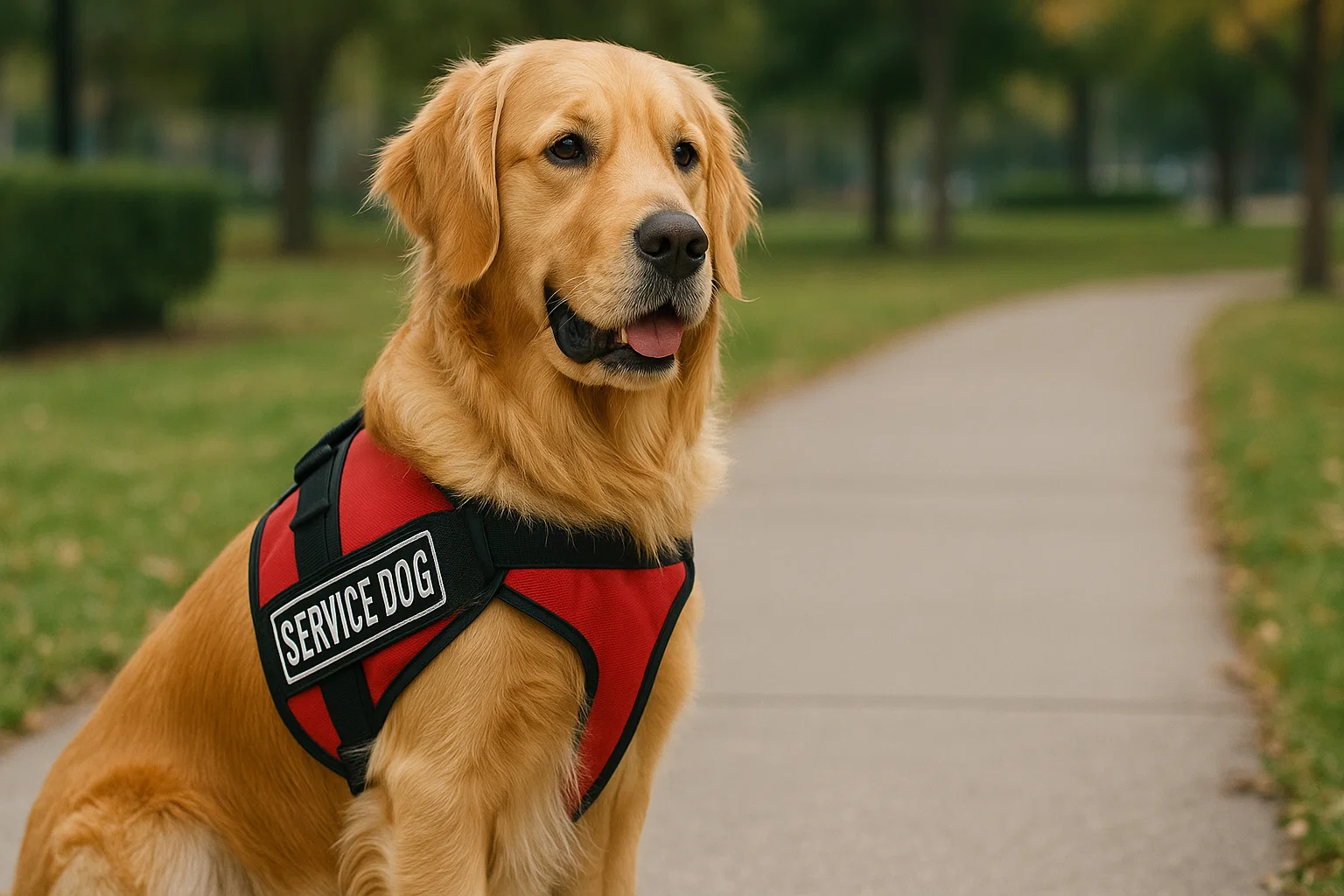Golden Retriever as a Service Dog

Golden Retrievers have long been celebrated for their friendly demeanor and intelligence, traits that make them ideal candidates for various roles, including that of a service dog. This article delves into the unique characteristics of the Golden Retriever and assesses its suitability as a service dog.
Golden Retriever Overview
Originating from Scotland, Golden Retrievers have been developed as versatile gun dogs, proficient in retrieving game from water and land. Their breed has gained widespread popularity, not only for their hunting capabilities but also for their companionship and service work.
Physical Characteristics
Golden Retrievers are medium to large-sized dogs known for their robust build and their beautiful, dense coat that ranges from cream to a rich golden hue. Typically, males weigh between 65-75 pounds and stand around 23-24 inches tall, whereas females weigh 55-65 pounds and stand around 21.5-22.5 inches tall.
Their physical attributes influence their suitability as service dogs:
- Size and Strength: Their substantial size grants them the strength required for mobility assistance tasks, such as helping retrieve items, opening doors, or providing balance support.
- Endurance and Energy Levels: Golden Retrievers have a high energy level, which sustains them through the physically demanding role of a service dog. Their stamina ensures they can accompany their handler on long outings without tiring easily.
- Appearance: The breed's approachable appearance can be an asset in settings where public interaction is crucial, easing any potential apprehensions from strangers.
Temperament and Attitude
The Golden Retriever is renowned for its gentle and friendly temperament. These dogs possess a patient disposition and thrive on human interaction, making them well-suited for service work.
- Social Nature: Golden Retrievers are naturally social dogs that enjoy the company of both people and other animals. Their affinity for social environments ensures they remain calm and collected in public settings.
- Eagerness to Please: This breed is highly driven by the desire to please their handlers, which aids in training and adherence to commands.
- Emotional Stability: Golden Retrievers tend to display resilience in stressful situations, maintaining their composure even amidst chaos, a crucial trait for maintaining the safety and well-being of their handlers.
Types of Service Work
Golden Retrievers are versatile service dogs, capable of performing various roles:
- Mobility Assistance: Due to their strength and size, they can help individuals with physical disabilities by providing balance support and retrieving objects.
- Medical Alert: Their keen sense of smell allows them to detect changes in a person's scent, enabling them to alert their handler to medical conditions like seizures or drops in blood sugar.
- Psychiatric Support: Golden Retrievers have a calming presence, which can provide comfort and reassurance to individuals suffering from psychological conditions such as PTSD or anxiety.
- Emotional Support: While technically not service dogs under the ADA, Golden Retrievers excel as emotional support animals, providing companionship and alleviating symptoms of depression and anxiety.
Health Considerations
Although they are generally healthy, certain breed-specific health issues may affect their service work:
- Hip and Elbow Dysplasia: Golden Retrievers are prone to joint issues, which can affect their mobility and ability to assist with movement-related tasks.
- Heart Conditions: Conditions like subvalvular aortic stenosis, a heart problem, can impact their endurance levels.
- Skin Conditions: Their dense coat requires regular grooming to prevent skin infections and allergies, which can be a consideration for handlers with allergies or sensitivity to dog hair.
- Cancer: Unfortunately, Golden Retrievers have a higher incidence of certain types of cancer than some other breeds, potentially shortening their lifespan as a service dog.
Proactive health monitoring and regular veterinary check-ups are crucial in maintaining their service work fitness.
Training and Suitability
Golden Retrievers are renowned for their trainability and intelligence. They are often top performers in obedience trials which speaks to their capacity for learning and executing commands efficiently.
- Intelligence: Ranked among the top 10 most intelligent dog breeds, Golden Retrievers quickly learn new commands and tasks, an essential trait for service dogs that require extensive training.
- Compliance and Willingness: Their eagerness to please contributes to their amenability to training. They respond well to positive reinforcement techniques, making the training process rewarding for both dogs and handlers.
- Focus and Drive: While they can be easily distracted, consistent training fosters focus and increases their drive to complete their tasks diligently.
Golden Retrievers are well-suited for service roles that involve repetitive tasks and require constant human interaction.
Summary of Golden Retriever
Overall, Golden Retrievers make excellent service dogs due to their unique combination of physical, emotional, and intellectual traits. However, potential owners and trainers should be mindful of their health considerations and maintenance needs.
- Strengths:
- Friendly and approachable demeanor
- High intelligence and trainability
- Strong and sturdy physique for mobility tasks
- Resilience in stressful situations
- Weaknesses:
- Prone to certain health issues such as hip dysplasia and cancer
- Requires significant grooming and maintenance
- Can be high-energy, needing regular exercise
- Ideal Service Roles:
- Mobility assistance
- Medical alert and response
- Psychiatric support
- Emotional support
Golden Retrievers offer joy, assistance, and companionship, and their loyal nature often makes them an invaluable addition to the lives of those they serve. By nurturing their positive traits and managing their health needs, these dogs can provide dedicated service for years.











